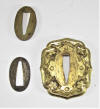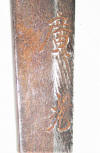A Nice Collection of Swords for all Seasons and Reasons:
Some of these are original manufacture. Some are nicely done replicas.
Click on a picture thumb nail to enlarge. Click on your browser's "back arrow" to return.
Large Samurai Sword: $225
This is a big-heavy two handed "magnum" sword. It took a mighty warrior to wield it. Swords of this type were often used to cut the fore-legs off of horses ridden by attacking horsemen.
Click on the picture to enlarge ... use your browser's back arrow to return
Cutlass 1: $95
A cutlass is a short-thick-heavy saber. It was short to allow use below decks in sailing vessels. It was thick and heavy to cut anchor, mooring and rigging lines. It was usually fairly straight so as to make making stabbing the enemy to death instinctively straightforward ... without much, if any, prior training.
Click on the picture to enlarge ... use your browser's back arrow to return
Cutlass 2: $85
A cutlass is a short-thick-heavy saber. It was short to allow use below decks in sailing vessels. It was thick and heavy to cut anchor, mooring and rigging lines. It was usually fairly straight so as to make stabbing the enemy to death instinctively straightforward ... without much, if any, prior training.
Click on the picture to enlarge ... use your browser's back arrow to return
Cutlass 3: $80
A cutlass is a short-thick-heavy saber. It was short to allow use below decks in sailing vessels. It was thick and heavy to cut anchor, mooring and rigging lines. It was usually fairly straight so as to make stabbing the enemy to death instinctively straightforward ... without much, if any, prior training.
Click on the picture to enlarge ... use your browser's back arrow to return
Cutlass 4: $150
A cutlass is a short-thick-heavy saber. It was short to allow use below decks in sailing vessels. It was thick and heavy to cut anchor, mooring and rigging lines. It was usually fairly straight so as to make stabbing the enemy to death instinctively straightforward ... without much, if any, prior training.
Click on the picture to enlarge ... use your browser's back arrow to return
Fantasy Saber: $90
The saber was the tool of a mounted horseman. It usually had a fair bit of curvature to facilitate slashing-cutting strokes. Stabbing an adversary from galloping horseback was do-able ... but ... problematic.
Click on the picture to enlarge ... use your browser's back arrow to return
Spartan Sword 1: $85
In very ancient times swords made of bronze and iron were irritatingly prone to breakage. Ancient swordsmiths and their warrier customers understood this quite well.
To prevent sword breakage, ancient craftsmen made their swords heavy ... often with a large reinforcing strip run down the side of the blade. This one is as much of a club, as it is a sword.
Click on the picture to enlarge ... use your browser's back arrow to return
Japanese Katana 1: $130
The japanese long sword (katana) is revered for presenting a perfect shape for either stabbing or cutting. Looking at a katana easily shows any eye that this is surely true.
Click on the picture to enlarge ... use your browser's back arrow to return
Japanese Katana 2: $125
The japanese long sword (katana) is revered for presenting a perfect shape for either stabbing or cutting. Looking at a katana easily shows any eye that this is surely true.
Click on the picture to enlarge ... use your browser's back arrow to return
Japanese Katana 3: $175
The japanese long sword (katana) is revered for presenting a perfect shape for either stabbing or cutting. Looking at a katana easily shows any eye that this is surely true.
Click on the picture to enlarge ... use your browser's back arrow to return
Japanese Katana 4: $85
The japanese long sword (katana) is revered for presenting a perfect shape for either stabbing or cutting. Looking at a katana easily shows any eye that this is surely true.
Click on the picture to enlarge ... use your browser's back arrow to return
Japanese Katana 5: $80
The japanese long sword (katana) is revered for presenting a perfect shape for either stabbing or cutting. Looking at a katana easily shows any eye that this is surely true.
Click on the picture to enlarge ... use your browser's back arrow to return
Japanese Katana 6: $140
The japanese long sword (katana) is revered for presenting a perfect shape for either stabbing or cutting. Looking at a katana easily shows any eye that this is surely true.
Click on the picture to enlarge ... use your browser's back arrow to return
Medieval Sword 1: $45
This is a "cut-and-thrust" sword common in medieval Europe.
Click on the picture to enlarge ... use your browser's back arrow to return
Medieval Sword 2: $155
Here is a long-and-heavy medieval "two-hand" sword. It took a mighty warrier to wield it.
Click on the picture to enlarge ... use your browser's back arrow to return
Medieval Sword 3: $110
This sword is a very functional cross between a stabbing broad-sword and a slashing scimitar.
Click on the picture to enlarge ... use your browser's back arrow to return
Rapier 1: $200
The rapier evolved in the Renaissance to allow attack and defence for un-armored royalty and citizens. It was long and skinny ... and ... very deadly. En guard, monseur!
Click on the picture to enlarge ... use your browser's back arrow to return
Rapier 2: $200
The rapier evolved in the Renaissance to allow attack and defence for un-armored royalty and citizens. It was long and skinny ... and ... very deadly. En guard, monseur!
Click on the picture to enlarge ... use your browser's back arrow to return
Barbarian Sword $100
This rather fancy sword may have existed for the pleasure of the wealthy, in ancient times. The brass fitting feature on the upper blade allows the hand to safely grab and shorten the stabbing distance. It also allows the oponent's blade to be caught and deflected.
Click on the picture to enlarge ... use your browser's back arrow to return
Saber 1: $45
The saber was the tool of a mounted horseman. It usually had a fair bit of curvature to facilitate slashing-cutting strokes. Stabbing an adversary from galloping horseback was do-able ... but ... problematic.
This full-size replica is perfect for backyard swash-buckling.
Click on the picture to enlarge ... use your browser's back arrow to return
Saber 2: $40
The saber was the tool of a mounted horseman. It usually had a fair bit of curvature to facilitate slashing-cutting strokes. Stabbing an adversary from galloping horseback was do-able ... but ... problematic.
This one is a small scale model with a high carbon spring steel blade. It would be a great letter opener and-or deadly stabbing dagger.
Click on the picture to enlarge ... use your browser's back arrow to return
Scottish Sword: $240
The people of Scotland were in a continuous state of war with England and each other for many generations. The fought on foot ... and ... this distinctive broad-sword, with a large "basket" hand guard, was what they typically preferred for use in combat.
Click on the picture to enlarge ... use your browser's back arrow to return
Viking Sword: $90
Viking pillagers often chose war axes as their weapon-of-choice. When they carried swords, they seemed to like thick-heavy-wide-straight blades with pronounced "blood grooves." .
Click on the picture to enlarge ... use your browser's back arrow to return
WW2 Japanese Military Saber: $600
This sword is absolutely unique. It is the "real-deal." It was manufactured during WW2 and would normally have been issued to a military officer as a side weapon. As it happens, this one was never issued. It is in "like-new" condition. This is a rare artifact from WW2 (I think) ... in nearly perfect condition.
There is a lot more information about this sword in a 11 megabyte pdf file, at this link.
Click on the picture to enlarge ... use your browser's back arrow to return
WW2 Japanese Samurai Sword: $400
This sword is a wonderful sword. It is the "real-deal." It was used during WW2 and would normally have been issued to a military officer as a side weapon. As it happened, this one has had a lot of use. This is a rare artifact from WW2 ... in restorable condition. Alternatively, leaving it just as it is tells an interesting story.
There is a lot more information about this sword in a 11 megabyte pdf file, at this link.
The pictures below show engravings on the sword tang. A friend with with contacts in the Japanese sword community was kind enough to get these inscriptions translated. Here is what they say:
The name of the swordsmith who made it is: "Hiromitsu."
The date of forging is: Showa 16 nen 10 gatsu ... which means October 1941.
A patriotic engraving on the tang translates: "Seven Lives for my country."
Apparently, Hiromitsu was a WW2 Seki smith. Seki City is one of the most well-known and highly regarded blade-producing areas in the world. The blade was made in an arsenal workshop.
For general interest, there is a huge amount of information about Japanese swords at this link:
http://www.japaneseswordindex.com/nihonto.htm
By-the-way, Hiromitsu may be kind of "stage name" for a WW2 swordsmith. As it happens, there was a very highly regarded swordsmith working in the 1300's with the name Hiromitsu. Here is a link to information about this swordsmith:
http://www.nihonto-museum.com/blog/soshu-hiromitsu
Click on the picture to enlarge ... use your browser's back arrow to return
Old Austro-Hungarian Saber: $550
This old Austro-Hungarian style cavalry saber is absolutely fantastic. It is the "real-deal." It was manufactured aroung 1900 and would normally have been issued to a cavalry officer as a side weapon.
As it happens, this one has a dull-round never sharpened edge ... and ... was probably used only in practice drills, if at all.
A stamped marking on the blade seems to indicate that the sword was made in Budapest, Hungary.
There is a lot more information about this sword in a 11 megabyte pdf file, at this link.
Click on the picture to enlarge ... use your browser's back arrow to return



